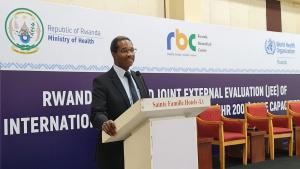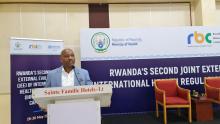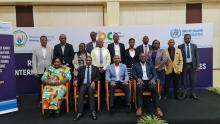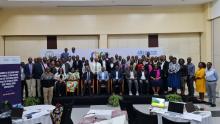Rwanda Conducts Second Joint External Evaluation to Strengthen Health Security
Kigali – With support from the World Health Organization (WHO), the Pandemic Fund and other regional partners, Rwanda is conducting its second Joint External Evaluation (JEE) of the International Health Regulations (IHR 2005) from 25 to 30 May 2025 in Kigali.
Building on the momentum of the first JEE conducted in 2018, which led to the development of the National Action Plan for Health Security (NAPHS) 2020–2024 and the establishment of One Health Multisectoral Coordination Mechanism, this second evaluation aims to further strengthen Rwanda’s capacity to prevent, detect, and respond to public health threats.
“This milestone offers us not only an opportunity to measure progress since our first JEE in 2018 but also to reflect critically on the lessons we’ve learned through our recent public health responses, particularly to COVID-19 and the Marburg outbreak” said Dr Albert Tuyishime, Head of the Departments of HIV and Disease Prevention and Control, Rwanda Biomedical Centre. He continued: “These experiences have tested our systems, strengthened our resolve, and underscored the importance of preparedness, coordination, and resilience”.
This year’s JEE emphasizes a whole-of-government and whole-of-society approach, highlighting high-level political commitment and cross-sectoral collaboration. The evaluation will assess Rwanda’s progress across 19 technical areas, including surveillance, laboratory systems, emergency response, risk communication, and antimicrobial resistance.
In his remarks, Dr Brian Chirombo, WHO Representative to Rwanda stated: “The Joint External Evaluation is a crucial and timely opportunity to take stock of progress the country has made, identify remaining gaps and define a clear path towards lasting, sustainable improvements”. He added: “The JEE aligns with global initiatives such as the Global Health Security Agenda and the World Organization for Animal Health’s Performance of Veterinary Services Pathway, supporting the development of multi-year national action plans that are essential for operational readiness, especially in resource-constrained settings”.
Dr Chirombo reaffirmed WHO’s commitment to supporting Rwanda in advancing emergency preparedness and building resilient public health systems through technical support, coordination and capacity-building.
Delivering remarks on behalf of Ms Nomathemba Mhlanga, FAO Representative a.i, Dr Austine Bitek, a representative from FAO, said, “At FAO, we recognize that safeguarding health requires a multisectoral, collaborative approach rooted in the One Health framework, which unites human, animal, and environmental health sectors. FAO stands ready to support Rwanda in strengthening the animal health sector's contribution to national health security.”
The evaluation brings together a wide range of stakeholders, including government ministries, local institutions, international organizations and civil society. Participating entities include Rwanda Agriculture and Animal Resources Development Board (RAB), Ministry of Environment (MoE), Ministry in Charge of Emergency Management (MINEMA), Rwanda Utilities Regulatory Authority (RURA), Rwanda National Police (RNP), Ministry of Defense (MoD), hospitals, WHO, US CDC, and Africa CDC. Together, these stakeholders are advancing the implementation and monitoring of national progress through a strong multisectoral approach. This collaborative initiative enhances coordination, optimizes resource use, and strengthens capacity building and monitoring and evaluation by leveraging the unique strengths of each sector.
The external evaluation itself is being conducted by a diverse team of subject matter experts from the WHO Regional Office for Africa, UNFPA, and the East, Central, and Southern Africa Health Community (ECSA-HC), together with experts from Kenya, Lesotho, Malawi, Uganda and Zambia.
The outcomes of the 2025 JEE will inform the development of the next National Action Plan for Health Security, guide national efforts to align with global health security standards, strengthen national preparedness, and contribute to global health security.
As Rwanda continues to make progress in strengthening its public health system, this second JEE marks a pivotal step in reinforcing national emergency preparedness and contributing to global health security. WHO remains committed to facilitating this process and ensuring that Rwanda’s health security priorities are effectively implemented and sustainably financed.



